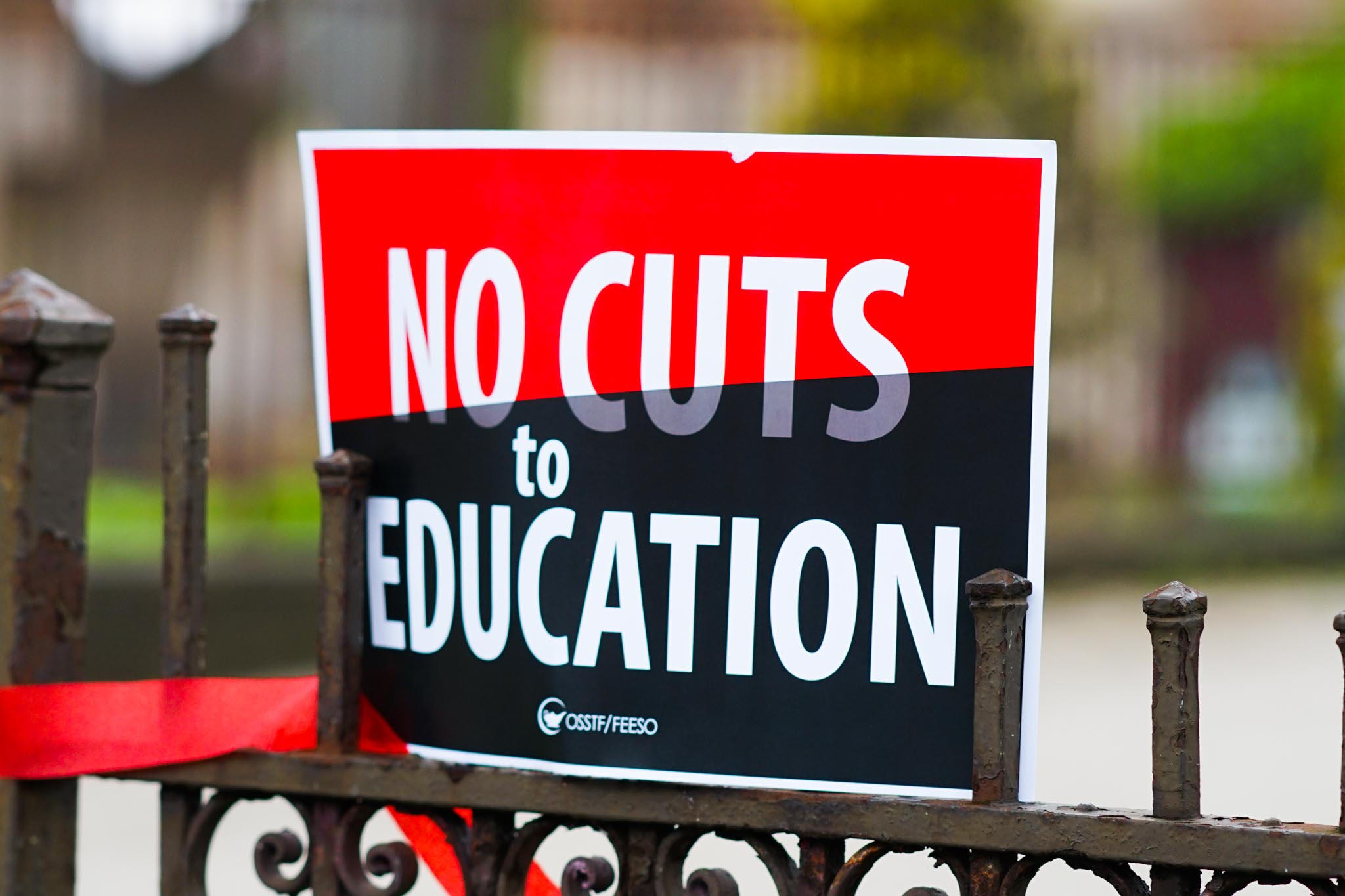What will it take to unseat the Tories? Episode 2
For people troubled about the education in Ontario, just getting rid of the Ford government doesn’t mean the sun is going to rise again on students, educators and schools. The Liberals let schools fall so far into disrepair that it wasn’t too hard for the Fordites to let them slip a little further into a $16.8 billion backlog. They pushed standardized testing through the annual EQAO tests. They used Bill 115 to tighten the screws on teachers and other education workers by imposing contracts limiting wages, paid sick leave and job actions. In 2016 the bill was found to be violation of their collective bargaining rights by the Ontario Superior Court of Justice and the since then, both Liberal and Tory governments have had to pony up $212.5 million to members of OSSTF, CUPE, OPSEU and, most recently, ETFO because of this. The Liberals didn’t substantially change Mike Harris’ funding formula for schools though its meant austerity across the province since 1997. The Liberals have been good at continuing neoliberal Tory policies with a more benign face.
Getting a taste of the NDP education platform
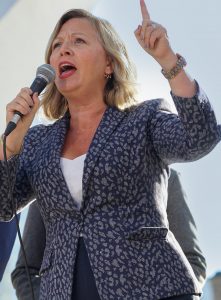 It’s not saying anything new that the NDP’s fortunes for the June election are linked, one way or the other, to the resurgence of Liberals across the province. With that in mind, I asked NDP Education critic Marit Stiles, what her party would do about some key issues schools and their communities face over the coming years. The NDP education platform isn’t out yet, but here’s a taste:
It’s not saying anything new that the NDP’s fortunes for the June election are linked, one way or the other, to the resurgence of Liberals across the province. With that in mind, I asked NDP Education critic Marit Stiles, what her party would do about some key issues schools and their communities face over the coming years. The NDP education platform isn’t out yet, but here’s a taste:
Repair backlog
To start climbing out of the $16.8 billion repair hole, the NDP will increase annual spending with a plan for measuring progress, like making public, the state of repair of schools like leaking roofs, ancient boilers and so on. Ms. Stiles says the NDP will address significant need for expansion of schools. Since, as she says, schools are “one of the biggest sources of public infrastructure” the party will promote a plan to make them greener.
Online Education
Online education throughout COVID has generally been a disaster for students and staff alike, but remember that Education Minister Stephen Lecce likes the money-making and efficiency potential of students learning at their computers and tried to mandate 4 online courses for high school kids to graduate. Teacher job actions got that down to 2 courses, but that’s still 2 online courses that have no business in education. Marit Stiles told me that the NDP would get rid of them completely; they were only there as part of the plan to cut 10 000 teachers across the province and ease privatization into the education sector. “Online learning,” she says, “has always had a role, but nothing replaces in-person learning.” The government, she adds, has never consulted with frontline educators about what works as far as online teaching is concerned.
School Boards and trustees
When Mike Harris brought in Bill 104: The Fewer School Boards Act in January 1997 he cut boards across the province from 129 to 72. He also cut the number of trustees along with their their pay. In Toronto, six public boards serving 300 000 students were chopped down to one. Trustees could no longer raise funds through local taxes to manage shortfalls in provincial funding. Now, school boards’ primary powers are to accept or decline whatever budget the provincial government decides to offer them and to hire and evaluate the performance of the local Director of Education. While they can help to shape board policy, they’ve become increasingly bureaucratic and distant from the people affected by them. The way the Toronto DSB has handled major incidents of racism in local schools, for example, points to how politicized and unwieldy it has become. In her 2015 review of the TDSB, Margaret Wilson described the endless paper chase that had become the principal’s job- caught between upper management who want to appear to be dealing with issues and school communities who actually want them addressed.
While amalgamation of school boards was a disaster, Marit Stiles said that “there’s not a lot of appetite right now to reverse it” – though, if boards said it was time to unravel the mess, the NDP would listen. A former TDSB trustee, Ms. Stiles thinks the issue is more about how the role of trustee has become devalued; trustees aren’t treated as though they are elected as representatives of their constituents. As it stands, trustees have become “useful pawns” acting as a buffer between the province and the public. The NDP would reconsider the role of trustees and the size of their wards by talking to local residents who benefit from a local voice. This exercise mustn’t be top down as was the case with two previous government reports on trustees. Also, students need a more powerful voice in local governance.
Grass roots organizing
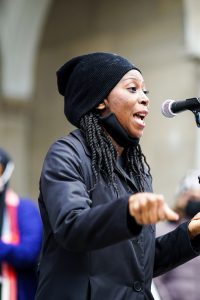 To defeat the Tories, it takes organization to offset their funding capacity. Local groups just don’t have the money to buy talent and the Ford government has made it harder to raise and pool funds through its perversely-named Protecting Ontario Elections Act. This is the one that was knocked down by a decision of Ontario Superior Court, until Doug Ford decided to use the “notwithstanding clause” to ignore it.
To defeat the Tories, it takes organization to offset their funding capacity. Local groups just don’t have the money to buy talent and the Ford government has made it harder to raise and pool funds through its perversely-named Protecting Ontario Elections Act. This is the one that was knocked down by a decision of Ontario Superior Court, until Doug Ford decided to use the “notwithstanding clause” to ignore it.
So, what is the NDP prepared to do in order to help local groups put their shoulders into the job of changing the political landscape? The party, says Marit Stiles, needs be the ongoing connection between local groups, amplifying their message, though she adds, some groups want to remain non-partisan. She’s been organizing groups in her Davenport riding and acknowledges that they all need funding and organizers to help them connect with others: “the NDP isn’t just a political party; it’s a movement.” It would be wonderful to see it take an active part in helping groups like OPAN, Queen Victoria Black Students for Success, Parkdale Parents Against Racism, York Communities and dozens of others. They need the financial and political support to get out a common message that change – not just in education – needs to happen in the province.
Anti – racism
If the NDP is still tinkering with its platform, it really must include a plank for moving ahead stronger than ever with strategies to combat racism, oppression and bigotry across the province. This has to go beyond superficial land acknowledgements, history and culture months to address the realities of current events, as D. Tyler Robinson TDSB teacher and one of the authors of a course about anti-Black racism listed: trucker protests organized by racists, conflating vaccine mandates with true oppression, kids allegedly using a Nazi salute in front of a Jewish teacher at Valley Park MS, the incomprehensible response by the Toronto DSB to statements like “Free Palestine” – all of these are among the symptoms that education systems don’t know what to do about racism, bigotry and oppression. As Mr. Robinson told me: “How can we have K-12 strategies for Math, English, Science, Phys-Ed etc. and not have a similar provincial strategy to combat racism/oppression? It’s truly absurd.”
Leadership is desperately needed.
Ridings to watch in Toronto
With that in mind, here’s an overview of ridings to watch across Toronto. Thanks to Paul Bocking, staff rep at CUPE Local 3902, whose research and analysis of these ridings informs the notes below.
Scarborough – Rouge Park
Though the Tories took this seat in 2018, it was a tight finish with the NDP. The riding is usually won by the Liberals with PCs and NDP switching back and forth for second place. With Elementary Teachers of Toronto executive Felicia Samuel running for the NDP, this is certainly a race that calls for progressives putting in some extra effort. The area didn’t get the support it needed during COVID, needs better transit, affordable child care and paid sick leave for residents.
Scarborough Centre
This was another close race between the PCs and NDP with the latter 5 points behind in a race that split the Liberals’ previous majority. The Liberals held the seat since 2003. It’s a large newcomer community experiencing problems with vaccine rollout during the pandemic. Affordable child care is a key issue here. PC incumbent Christina Mitas is not running this time. Neethan Shan of the Urban Alliance on Race Relations is the NDP candidate.
York South – Weston
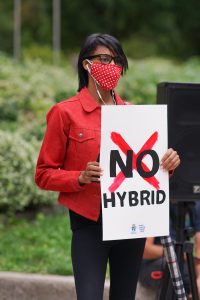 NDP MPP Faisal Hassan took this riding from the Liberals in 2018 with a tiny decrease in the vote from 2014 – it’s just that Liberals dropped 20 points. This is an old NDP riding, though the Liberals held it from 1999 -2018. They may well be back. Key issues are affordable child care and paid sick leave. Progressive educators should get out and support the NDP here.
NDP MPP Faisal Hassan took this riding from the Liberals in 2018 with a tiny decrease in the vote from 2014 – it’s just that Liberals dropped 20 points. This is an old NDP riding, though the Liberals held it from 1999 -2018. They may well be back. Key issues are affordable child care and paid sick leave. Progressive educators should get out and support the NDP here.
Humber River – Black Creek
This is another longtime Liberal riding in which the NDP has gradually made inroads. NDP incumbent Tom Rakocevic came within 1800 votes of Mario Sergio in 2014, but in 2018, as in most other ridings, the bottom fell out of the Liberals lead and went to the PCs who are currently within 7 points of the NDP. Toronto Catholic Board trustee Ida Li Preti is running for the Liberals. Like so many other parts of the city, public transit, affordable child care and paid sick leave are the key issues. The NDP could do with help here.
Beaches – East York
NDP MPP, Rima Berns-McGown was elected in 2018 splitting the loss of Liberal vote with the PCs to come out ahead by a substantial margin over the Liberal incumbent. She’s a member of the NDP’s Black Caucus. This time the Liberals are putting up former city councillor Mary-Margaret McMahon who will likely draw back some support in a riding that has alternated between Liberals and NDP. The south end of the riding is becoming more affluent with gentrification and moving Liberal. Support for the NDP needed here.
Toronto – St. Paul’s
In 2018 the NDP with Jill Andrew, also a member of the Black Caucus, the picked up the vote the Liberals lost in this riding, one of their strongholds over the years. Still, the NDP only won by 3 points. She came out of the gate strong with her condemnation of the TDSB for transferring rather than firing a principal who racially profiled students at Etobicoke School for the Arts and, in the Legislature, recently called out for a K-12 Afrocentric mandatory curriculum. But, Jill Andrew is vulnerable.
Spadina – Fort York
Former TDSB trustee Chris Glover won this riding for the NDP in 2018, again capitalizing on votes lost by the Liberals who themselves took it from longtime NDP member Rosario Marchese in 2014. As member for Trinity-Spadina, Mr. Marchese held the riding which spread north and west from the current riding, since 1990. There’s good potential here for Chris Glover a strong voice in support of education and critic for technology, development and innovation. Key issues are the massive increase in condos as well as a school to be built in a new highrise development. Known as a “vertical school”, it’s to be built in partnership between the TDSB and Menkes Development, something that raises serious concerns about the use of public/private partnerships (PPPs).
University – Rosedale
NDPer, Jessica Bell took this newly created riding in 2018 with a 27 percent lead over the Liberals. She’s been the NDP housing and transit critic, has been active in housing and transit issues for years and organized promoting the Green New Deal. The PCs and Liberals finished pretty much neck and neck for second place last time around. So, the real head scratcher is why on earth the Green Party is running environmental lawyer, Diane Saxe against her. All this will do is split the vote and give an edge to the Liberals. It makes no sense for progressive politics.
Parkdale – High Park
Bhutila Karpoche kept this riding for the NDP after Cheri di Novo, who represented it since 2006, returned to the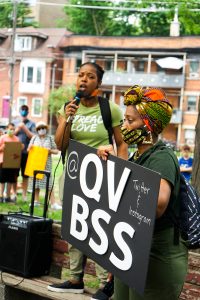 ministry before the last election. She had a massive lead over the PC candidate who came in second in 2018 and is considered to be a strong incumbent. Key issues here revolve around transit and tenants’ rights vs evictions and rent increases and worries about gentrification in the area. There have also been unresolved incidents of anti-Black racism in Parkdale schools; parents and community members are active there.
ministry before the last election. She had a massive lead over the PC candidate who came in second in 2018 and is considered to be a strong incumbent. Key issues here revolve around transit and tenants’ rights vs evictions and rent increases and worries about gentrification in the area. There have also been unresolved incidents of anti-Black racism in Parkdale schools; parents and community members are active there.
Davenport
Education critic and former TDSB trustee, Marit Stiles drew 60 percent of the votes for the NDP last time in a riding that has shifted back and forth between the NDP and Liberals since the 2011 election. Key issues here concern online learning and return to in-person teaching, paid sick leave, precarious work, struggling small business, transit and the effects of development in the Dupont and Dufferin area.
Finally, as I mentioned in Episode 1, NDP leader Andrea Horwath must seriously up her game if her party is to maintain its claim to being progressive. This isn’t helped by saying she is not opposed to Doug Ford’s latest election gambit – eliminating vehicle license renewal fees and foregoing the $1 billion in revenues they provide. As teacher and activist, Derik Chica pointed out in the Star this morning, why not just eliminate the fee for people who need a car to get to work, but can’t afford to lay out the extra cost to renew their stickers every year? Is Andrea Horwath trying to play to the right of the Liberals again? That didn’t work so well in 2014 and it’s just as pointless now.

